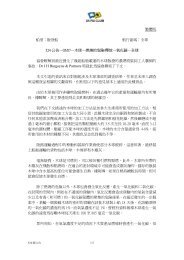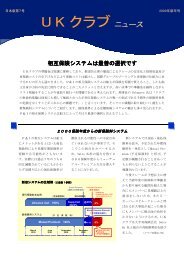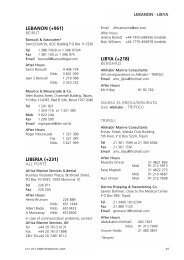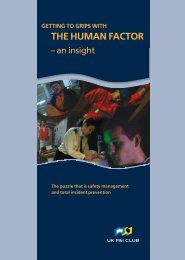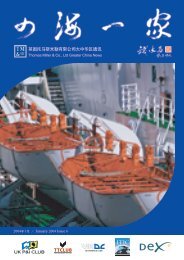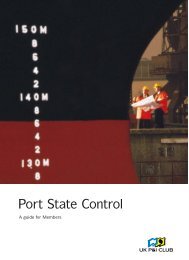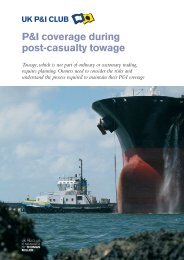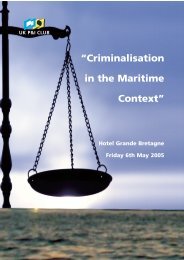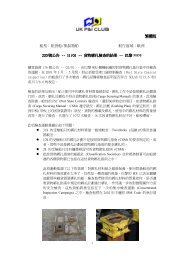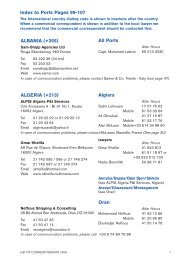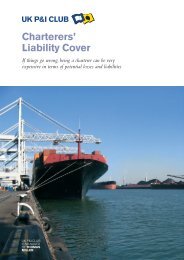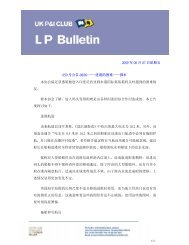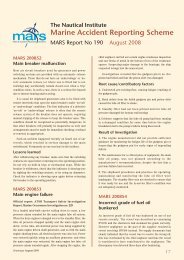Create successful ePaper yourself
Turn your PDF publications into a flip-book with our unique Google optimized e-Paper software.
taking carePANAMA CANALAccidentand cargoclaimsWe have recently noted changes in themanner in which administrative claims forvessel accidents and cargo damage arebeing processed by the Panama CanalAuthority (PCA). The organic law of thePanama Canal provides that the PCA isresponsible for damages suffered byvessels, their cargoes, crew or passengerswhile transiting the Panama Canal andwhich are caused by the negligence of thePCA. The law further provides that the PCAshall promptly adjust and pay suchdamages. The enabling statute governingthe operation of the Panama Canal by thePanama Canal Commission, USadministered predecessor of the PCA,contained a similar provision regarding thedisposition and adjudication of theaforementioned claims. For the first fewyears subsequent to its assuming full controlof the operation and maintenance of thePanama Canal, the PCA did in fact promptlyadjust and pay such damages, in line with itsoften-repeated position that the PanamaCanal would continue to be administered inthe same or better manner as in the past.We are aware of at least one claimwherein the PCA has failed or declined forreasons best known to its administrator andlegal department, to make a finaladjudication of said claim, even though thatclaim had been pending before the PCA forover 21 months. Additionally, claimantsadvised the PCA more than 10 months agothat they would not be presenting furtherinformation and documentation withrespect to their claim and specificallyrequested that the claim be adjudicated.This apparent new position by the PCArespecting the handling and adjudicationof administrative claims is a source of greatconcern because the PCA is attempting toassert that it cannot be sued until itadjudicates a claim regardless of the time it(the PCA) takes to adjudicate such claim. Ifthe PCA takes this seemingly capriciousposition to an extreme, a party, whethershipowner, cargo owner or passenger,could be waiting indefinitely for their claimto be adjudicated, without having anyother recourse under the law (asinterpreted by the PCA) to force the PCAto resolve its claim and reimburse theclaimant for any damages suffered as aconsequence of the fault of the PCA ■........................................................................................................................................................................................UNITED STATES OFAMERICAThe dangersof enteringconfinedspacesIn a recentincident, a ship'ssecond engineerlost his life whenhe entered andbecame trapped in themain engine's scavenging airreceiver. In this case, the ship reported thatthe second engineer was missing prior tosailing. Despite an extensive search byship's personnel of all areas including manysearches of the machinery spaces and themain engine, the engineer could not befound therefore it was presumed he hadgone ashore and missed sailing. Uponarrival at the next port the individual wasfound deceased behind an access door tothe main engine scavenging air receiver.It was determined that theengineer entered the scavengingair receiver alone. The reason forentering the receiver is not known,although engine maintenance wasperformed in that space whilst at thefirst port and, therefore, he may havereturned to inspect the area for tools leftbehind or to retrieve something. It appearsthat after his entry, the easily-moved,inward-opening, hinged door accidentallyclosed (see photographs). Investigatorsbelieve that at that time, the upper leftdog – due to its weight and perhaps thevibration of the door as it closed – moved,allowing its edge to catch thecircumferential lip at the opening. Oncecaught, even with the loosened fastener,the door could no longer be opened frominside the receiver. The engineer wouldhave initially had sufficient quantities ofoxygen to breath, but when the enginewas started the conditions inside thereceiver would have dramatically changedand caused the fatality.It is important to note that the secondengineer was an experienced marinerwho, it was reported, was trained andfamiliar with the ship's confined spaceentry procedure. In all previous instances,he had followed the procedures and safelyperformed maintenance inside the space.Unfortunately, on this occasion he enteredwithout informing anyone or having anassistant stationed outside.continued over<strong>17</strong>



